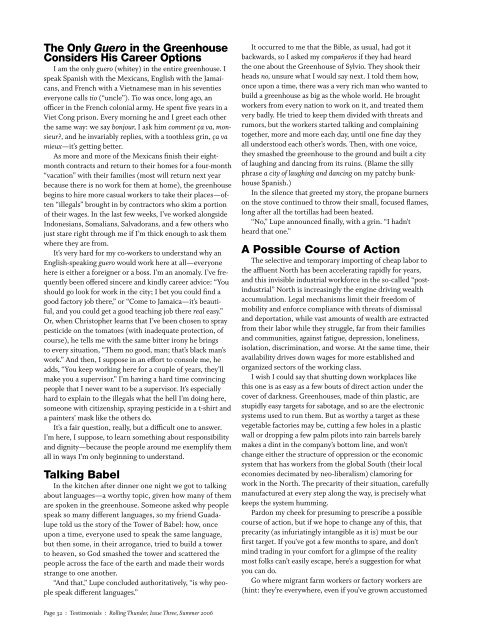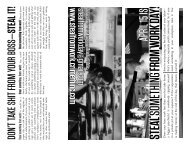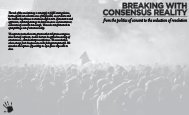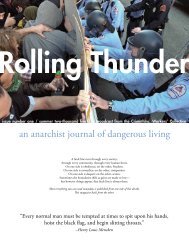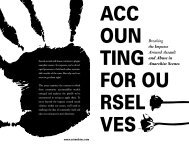Rolling Thunder - CrimethInc
Rolling Thunder - CrimethInc
Rolling Thunder - CrimethInc
You also want an ePaper? Increase the reach of your titles
YUMPU automatically turns print PDFs into web optimized ePapers that Google loves.
The Only Guero in the GreenhouseConsiders His Career OptionsI am the only guero (whitey) in the entire greenhouse. Ispeak Spanish with the Mexicans, English with the Jamaicans,and French with a Vietnamese man in his seventieseveryone calls tio (“uncle”). Tio was once, long ago, ano∞cer in the French colonial army. He spent five years in aViet Cong prison. Every morning he and I greet each otherthe same way: we say bonjour, I ask him comment ça va, monsieur?,and he invariably replies, with a toothless grin, ça vamieux—it’s getting better.As more and more of the Mexicans finish their eightmonthcontracts and return to their homes for a four-month“vacation” with their families (most will return next yearbecause there is no work for them at home), the greenhousebegins to hire more casual workers to take their places—often“illegals” brought in by contractors who skim a portionof their wages. In the last few weeks, I’ve worked alongsideIndonesians, Somalians, Salvadorans, and a few others whojust stare right through me if I’m thick enough to ask themwhere they are from.It’s very hard for my co-workers to understand why anEnglish-speaking guero would work here at all—everyonehere is either a foreigner or a boss. I’m an anomaly. I’ve frequentlybeen o≠ered sincere and kindly career advice: “Youshould go look for work in the city; I bet you could find agood factory job there,” or “Come to Jamaica—it’s beautiful,and you could get a good teaching job there real easy.”Or, when Christopher learns that I’ve been chosen to spraypesticide on the tomatoes (with inadequate protection, ofcourse), he tells me with the same bitter irony he bringsto every situation, “Them no good, man; that’s black man’swork.” And then, I suppose in an e≠ort to console me, headds, “You keep working here for a couple of years, they’llmake you a supervisor.” I’m having a hard time convincingpeople that I never want to be a supervisor. It’s especiallyhard to explain to the illegals what the hell I’m doing here,someone with citizenship, spraying pesticide in a t-shirt anda painters’ mask like the others do.It’s a fair question, really, but a di∞cult one to answer.I’m here, I suppose, to learn something about responsibilityand dignity—because the people around me exemplify themall in ways I’m only beginning to understand.Talking BabelIn the kitchen after dinner one night we got to talkingabout languages—a worthy topic, given how many of themare spoken in the greenhouse. Someone asked why peoplespeak so many di≠erent languages, so my friend Guadalupetold us the story of the Tower of Babel: how, onceupon a time, everyone used to speak the same language,but then some, in their arrogance, tried to build a towerto heaven, so God smashed the tower and scattered thepeople across the face of the earth and made their wordsstrange to one another.“And that,” Lupe concluded authoritatively, “is why peoplespeak di≠erent languages.”It occurred to me that the Bible, as usual, had got itbackwards, so I asked my compañeros if they had heardthe one about the Greenhouse of Sylvio. They shook theirheads no, unsure what I would say next. I told them how,once upon a time, there was a very rich man who wanted tobuild a greenhouse as big as the whole world. He broughtworkers from every nation to work on it, and treated themvery badly. He tried to keep them divided with threats andrumors, but the workers started talking and complainingtogether, more and more each day, until one fine day theyall understood each other’s words. Then, with one voice,they smashed the greenhouse to the ground and built a cityof laughing and dancing from its ruins. (Blame the sillyphrase a city of laughing and dancing on my patchy bunkhouseSpanish.)In the silence that greeted my story, the propane burnerson the stove continued to throw their small, focused flames,long after all the tortillas had been heated.“No,” Lupe announced finally, with a grin. “I hadn’theard that one.”A Possible Course of ActionThe selective and temporary importing of cheap labor tothe a±uent North has been accelerating rapidly for years,and this invisible industrial workforce in the so-called “postindustrial”North is increasingly the engine driving wealthaccumulation. Legal mechanisms limit their freedom ofmobility and enforce compliance with threats of dismissaland deportation, while vast amounts of wealth are extractedfrom their labor while they struggle, far from their familiesand communities, against fatigue, depression, loneliness,isolation, discrimination, and worse. At the same time, theiravailability drives down wages for more established andorganized sectors of the working class.I wish I could say that shutting down workplaces likethis one is as easy as a few bouts of direct action under thecover of darkness. Greenhouses, made of thin plastic, arestupidly easy targets for sabotage, and so are the electronicsystems used to run them. But as worthy a target as thesevegetable factories may be, cutting a few holes in a plasticwall or dropping a few palm pilots into rain barrels barelymakes a dint in the company’s bottom line, and won’tchange either the structure of oppression or the economicsystem that has workers from the global South (their localeconomies decimated by neo-liberalism) clamoring forwork in the North. The precarity of their situation, carefullymanufactured at every step along the way, is precisely whatkeeps the system humming.Pardon my cheek for presuming to prescribe a possiblecourse of action, but if we hope to change any of this, thatprecarity (as infuriatingly intangible as it is) must be ourfirst target. If you’ve got a few months to spare, and don’tmind trading in your comfort for a glimpse of the realitymost folks can’t easily escape, here’s a suggestion for whatyou can do.Go where migrant farm workers or factory workers are(hint: they’re everywhere, even if you’ve grown accustomedto not seeing them), and spend a season plantingtobacco, plucking chickens, or harvesting field vegetables.Learn the language. Make friends with your coworkers.For every minute you spend talking, spend atleast ten minutes listening. Think hard about what itmeans to be an ally. Don’t take yourself too seriously;remember that you experience things di≠erently,knowing you can leave at any time. Take note of everytime your privilege smoothes your way for you, ofevery gift you are given. Don’t let your politics be afilter for making sense of your experiences; let yourinteractions with the people around you inform yourpolitics. Share what you learn with friends and familyback home. Sharpen your indignation at the injusticesyou witness, and twist your useless First World guiltinto a vow to live di≠erently. The workers—the oneswho are there because they have no choice—will dothe rest. You’d do well to learn to speak their languageso that when the time comes for them to call on theirallies, you’ll understand what they’re asking of you.Page 32 : Testimonials : <strong>Rolling</strong> <strong>Thunder</strong>, Issue Three, Summer 2006


